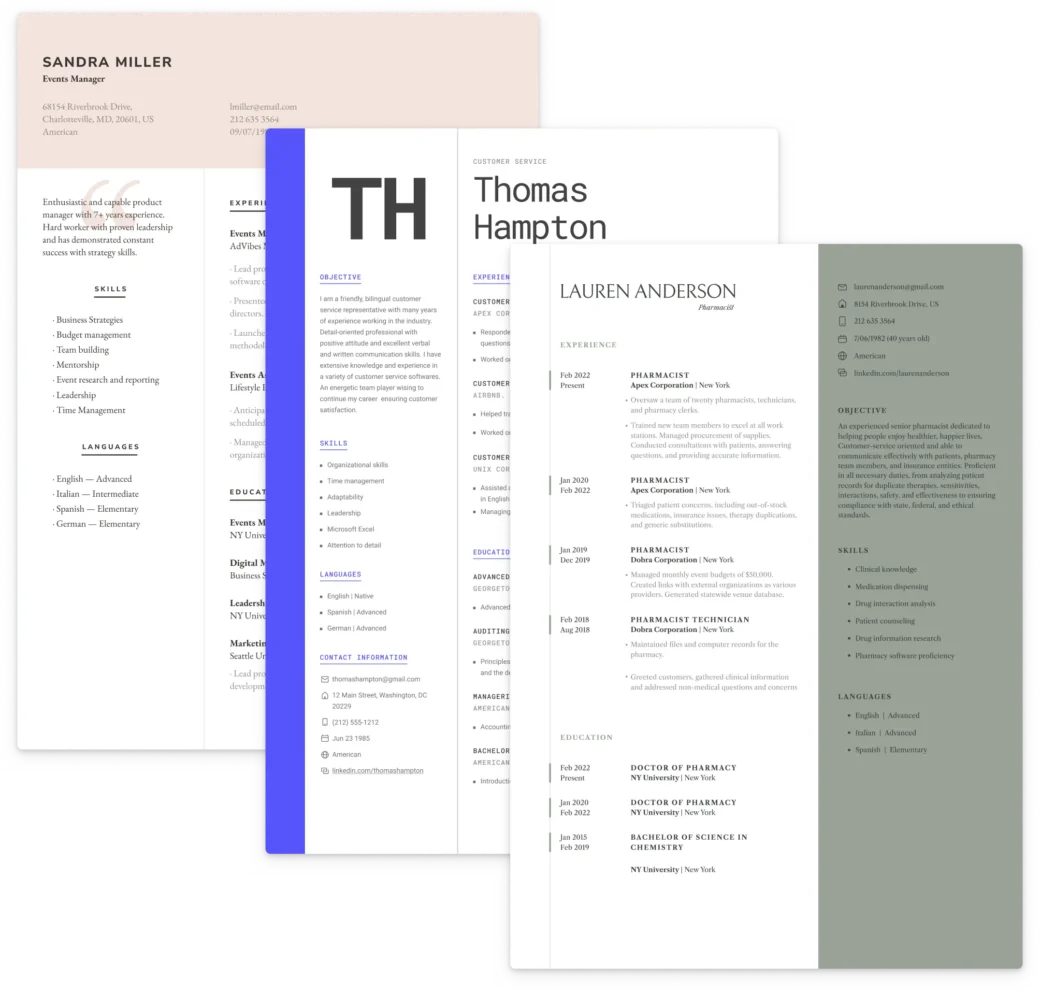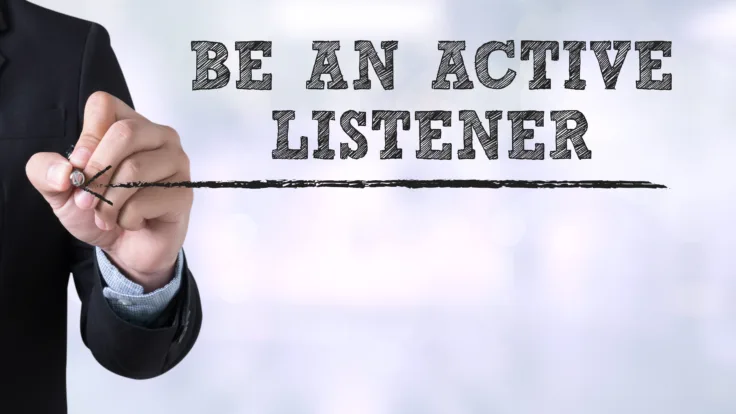While making great presentations and being eloquent are sure to get you noticed in a corporate environment, active listening skills can give you the competitive advantage that you need to truly stand out.
Whenever you work with other people, active listening skills can come in handy. In this article, we’ll discuss some active listening skills you should work on, and that look great on any resume and impress recruiters.
With our free resume builder, you can add active listening skills that are relevant to your role and land an interview in no time.
What Is Active Listening?
Active listening is the ability to fully focus on a speaker or group of speakers by paying attention to the verbal and non-verbal messages that are being conveyed and acknowledging those messages.
Some people seem to have innate active listening skills, but the good news is that it can also be learned and developed. Some active listening skills examples include eye contact, paraphrasing, and verbal cues, such as “sure” or “I understand”.
Active listening involves providing feedback to the communicator to let them know that they are being heard and understood. It also ensures that you can recall details of the conversation without needing to listen to the information again.
5 Active Listening Skills That Look Great on a Resume
Strong listening skills can set you apart in any job where you work with other people, such as roles in customer service, project management, healthcare, or tech.
Here are some of the top active listening examples that look great on a resume, and why they matter:
Focused listening
This skill demonstrates that you can stay present in conversations and shows reliability and professionalism. This is key for roles involving speaking with clients or with a group of coworkers.
Here’s an example of how to say you are a good listener on your resume.
- Actively listened to client concerns during meetings, providing accurate solutions and avoiding repeated follow-ups.
Reflective paraphrasing
By using reflective paraphrasing, you will be restating key points, which shows that you understand others clearly. This active listening technique makes you an asset in collaborative and leadership positions.
- Rephrased project requirements during team discussions to confirm shared understanding and prevent miscommunication.
Empathetic communication
Actively showing empathy by recognizing emotions and responding with sensitivity, making this skill ideal for roles in HR, healthcare, counseling, and customer service.
- Improved satisfaction scores by 20% by acknowledging customer frustrations and responding with tailored support.
Nonverbal communication
Reading and responding appropriately to body language, tone, and facial expressions to strengthen mutual understanding during interactions.
- Recognized signs of confusion in a training session and adjusted explanations to match participants’ needs.
Summarizing
By knowing how to summarize conversations in the workplace effectively, you can make sure that your team stays focused. This is especially useful if you work in a fast-paced or remote work setting.
Here’s an example of how to show you are a good listener in your resume experience section.
- Provided clear end-of-meeting recaps that highlighted key action items, keeping teams aligned on priorities.
How To Add Active Listening Skills to Your Resume
Recruiters want to see evidence that you can collaborate, understand others, and communicate effectively.
Below are some active listening examples tailored for various professions that reflect active listening in action:
Customer service or support roles
Active listening is key in support roles. Adding this skill to your experience section with quantifiable data, like in the following example, can help you win over a recruiter.
Resolved customer concerns 25% faster using active listening techniques, by carefully listening to their issues and asking clarifying questions.
Healthcare or caregiving
When working with elderly or ill patients as a nurse or in another similar role, it’s essential to listen actively. Here’s how you can add your skills to your resume:
Collaborated with 5+ multidisciplinary teams by actively listening during rounds and clearly communicating patient updates.
Tech and project management
If you’re in project management or working in a tech role, it’s key to be able to ask follow-up questions or sum up conversations accurately. Below is an example of how it can be added to your resume:
- Clarified vague project requirements by asking follow-up questions and restating goals, reducing scope creep by 30%.
- Introduced consistent feedback loops and conversation summaries into cross-functional meetings to align global remote teams.
Benefits of Developing Active Listening Skills
There are multiple benefits for those who choose to diligently work on their communication and active listening skills. Here is a list of the most important ones.
Listening generates trust
Listening carefully without interrupting does not go unnoticed in the workplace. It is essential when creating trusting relationships with business partners, customers, and colleagues.
Active listening helps you solve problems
Active listening helps you pick up on what others may miss. Dedicating your full attention to your speaker, observing their body language, and asking the right questions at the right time will often help you improve your problem-solving skills.
-
💡 Our expert’s advice

Asking the right question can help you identify the problem quickly, allowing you to propose the appropriate solution efficiently.
Helps you avoid missing critical information
As an active listener, you are dedicating your full attention to the person communicating with you. This means that you will rarely miss critical information, which is always a major plus that can save a lot of time and effort in a corporate context.
Helps provide more career opportunities
Employees with active listening skills are bound to be noticed more quickly by management in the workplace, resulting in more interesting projects, and, possibly, more responsibility and better advancement opportunities.
How To Develop Active Listening Skills
Not sure how to develop your active listening skills? Here are some small things you can start doing at work to become a great active listener.
Practice asking clarifying questions
If you’re unsure about a detail, don’t hesitate to ask for clarification. This shows that you are paying attention and prevents mistakes that could come from assumptions.
Take notes during conversations
Writing down key points during meetings or discussions helps you stay focused on what’s being said. It’s a good way to make sure you don’t forget important details later and gives you something concrete to reference once you start the previously discussed task.
Limit distractions when listening
Put away your phone and focus on the speaker. Small changes like these help you stay fully present and make a stronger impression.
Reflect before responding
Take a moment to process what’s been said before giving your answer. This pause can help reduce misunderstandings and provide you with time to form a more thoughtful response.
Key Takeaways
Understanding how to be an active listener and its benefits are not only great for personal reasons, but also for your career.
Active listening can provide better career opportunities and can help make sure you retain important information on a daily basis.
Adding skills like reflective paraphrasing and empathetic communication to your resume and explaining how you use them throughout your resume can help you land your next dream job, especially if you’re in healthcare, education, or management.
Turning active listening into a career advantage starts with how you present it to employers. With the right resume template and expert review, you can make sure your listening skills and qualifications shine.
Remember, active listening is much more than a soft skill. It’s something you can use in almost any job to help you build workplace relationships, prevent problems, and efficiently complete your tasks.

Build your perfect resume with ease
Craft the perfect resume effortlessly with our builder. Get started today!
Related Posts

